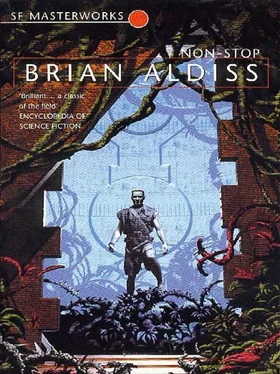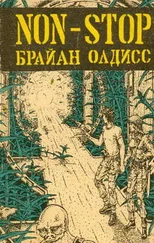Now the comprehension was growing on them. It seemed, oddly enough, to soak from the inside to the outside, as if, in some mystical way, the truth had been trapped in them all along. The awful pleasure of making them know the worst — they who had tortured him — filled Fermour. He went on, suddenly keen to make them see how damned they were.
‘That’s why we proper Earthmen call you “dizzies”: you live so fast, it makes us dizzy. But that isn’t all that is wrong with you! Imagine this great ship, still automatically functioning despite the lack of anyone to control it. It supplied everything: except the things which, by its nature, it could not supply, fresh vitamins, fresh air, fresh sunlight. Each of your succeeding generations becomes smaller; Nature survives how she may, and that was her way of doing it, by cutting down on the required materials. Other factors, such as inbreeding, have changed you until — well, it was decided you were virtually a separate race. In fact, you had adapted so well to your environment, it was doubtful if you would be able to survive if transferred down on Earth!’
Now they had it, knowing it right down to the pits of their stomachs. Fermour turned from their sealed faces, ashamed of himself for feeling triumph. Methodically, he resumed prodding about for the particular panel he wanted. He found it, and they were still all standing in choked silence. Using the saw, he began eagerly to work away the seared casing.
‘So we’re not human beings at all…’ Complain exclaimed, as if speaking to himself. ‘That’s what you’re saying. All that we’ve suffered, hoped, done, loved… it’s not been real. We’re just funny little mechanical things, twitching in a frenzy, dolls activated by chemicals… Oh, my God!’
As his voice fell, they all heard the noise. It was the noise they had heard by the personnel lock, the noise of a million rats, flowing irresistibly through the hard honeycomb of the ship.
‘They’re heading here!’ Fermour yelled. ‘They’re coming this way! It’s a dead end. They’ll swamp us! We’ll be torn to pieces!’
Now he had the casing off, tearing it away with his hands, flinging it behind him. Beneath it, severed from their toggles, lay eighty-four double ranks of transistors. Using the side of his saw, Fermour frantically bashed the pairs together. Sparks flew and — the terrible sound of the rodent army cut off abruptly. Every deck was closed from its neighbour; all the inter-deck doors, on every level, had clicked firmly shut, tombing off further communication.
Gasping, Fermour rocked back against the panelling. He had worked the trick just in time. The thought of the horrible death he had so narrowly avoided overcame him, and he was sick on the floor.
‘Look at him, Roy!’ Gregg shouted, pointing his sound hand in scorn. ‘You were wrong about us, Roy! We’re as good as he, or better. He’s scared green…’
He advanced to Fermour, clenching his one good fist; Marapper followed, dragging out a knife.
‘Someone’s got to be sacrificed for all this deadly wrong,’ the priest said, through clenched teeth, ‘and it’s going to be you , Fermour — you’re going to make the Long Journey on behalf of twenty-three generations of suffering! It would be a nice gesture.’
Dropping the saw helplessly, Fermour just stood there without defence. He did not move or speak; it was almost as if he saw the priest’s point of view. Marapper and Gregg came on. Complain and Vyann stood unmoving behind them.
As Marapper’s blade came up, an unexpected clangour filled the dome beneath which they were grouped. Mysteriously, the shutters, closed since the days of Captain Gregory Complain, sprang back to reveal the long windows. Three-quarters of a great sphere all round the five of them was turned in a twinkling into space. Through the hyaline tungsten, the universe breathed in at them; on one side of the ship, the sun burned tall and strong; on the other, Earth and moon were radiant globes.
‘How did that happen?’ Vyann asked, as the clattering echoes died.
They looked round uneasily. Nothing stirred.
Rather sheepishly, Marapper tucked his knife away. The view was too mighty to be stained with blood. Gregg, too, turned away from Fermour. Sunlight washed over them, seeming to deafen them. Fermour at last managed to speak.
‘It’ll be all right,’ he said quietly. ‘None of us need to be worried. The ship will come up from Little Dog and put the fire out and kill the rats and tidy things up, and then we’ll open up the decks again and you’ll be able to go on living as before.’
‘Never!’ Vyann said. ‘Some of us have devoted our lives to getting out of this tomb. We’ll die sooner than stay!’
‘That’s what I was afraid of,’ Fermour said, almost to himself. ‘We’ve always thought this day might come. It’s not entirely unprepared for — others before you have found out vital secrets, but we’ve always managed to silence them in time. Now… Well, you might be all right on Earth: we have taken some of your babies down there, and they’ve survived, but we’ve always –’
‘We!’ Vyann exclaimed. ‘You keep saying “we”! But you are an Outsider, an ally of the Giants. What relation are you to true Earthmen?’
Fermour laughed without humour.
‘Outsiders and Giants are true Earthmen,’ he said. ‘When “Big Dog” was towed into orbit, we — Earth — fully realized our grave responsibility to you all. Doctors and teachers were your especial need. Holy men were required, to counter the vile irreligion of the Teaching — which, vile though it was, undoubtedly assisted your survival in some measure. But there were snags: the doctors and people could not just creep into the air locks and mingle with you, easy though that was, with the inspection way system and the hydroponic tangles to shelter them. They had to be trained at Little Dog Institute to move and speak as quickly as possible, to sleep in catnaps, to — oh, in short to act like dizzies. And to bear the horrible stench in the ship. And, of course, they had to be abnormally small men, since none of you are above five feet high.
‘Some of these men, performing a dangerous mission, you knew and liked. Doctor Lindsey and Meller, the artist, were both Earthmen stationed in Quarters — Outsiders, but your friends.’
‘… And you,’ Complain said. He made a sweeping gesture before his face; a moth circled there, eluding his hand.
‘I’m an anthropologist,’ Fermour said, ‘although I also tried to help spread the light. There are several of us aboard. This is a unique chance to discover the effects of a closed environment on man; it has taught us more about man and society than we have been able to learn on Earth for centuries.
‘Zac Deight was head of everyone on board whom you would call Outsiders. Our usual term of field work aboard is two years — my time is nearly up, but I can’t stay here now; I shall go back home and write a thesis on being an Outsider. The field work has its personal rewards: it’s arduous, yet not particularly dangerous, unless one runs against efficient people like Scoyt. Zac Deight loved dizzies — loved you. He stayed in the ship long beyond his term, to try and soften conditions and lead Forwards’ thought back into more normal channels — in which he was very successful, as you can see if you compare conditions in Forwards with conditions in a Deadways tribe like Quarters.
‘He was a wonderful man, Zac Deight, a humanist like Schweitzer in the twentieth or Turnball in the twenty-first century. Perhaps I shall amass his biography when I’ve finished my thesis.’
Discomfort rose in Complain at this, to recall how he and Marapper had shot down the old councillor without compunction.
Читать дальше










